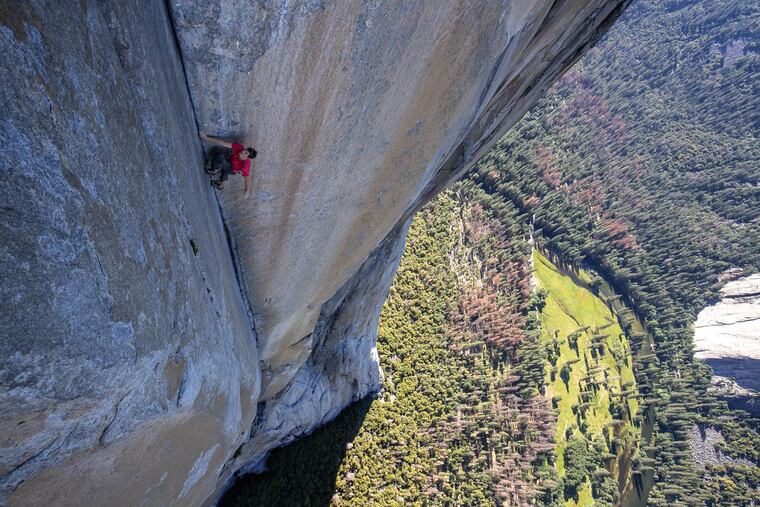Oscar-winner ‘Free Solo’ is coming to TV, and you won’t be alone if you watch with your heart in your mouth
Even cinematographer Mikey Schaefer found it hard to watch his friend Alex Honnold's rope-free ascent of Yosemite's El Capitan -- and he's become a magnet for people who also have trouble with it.

Mikey Schaefer spotted me easily.
As clips from Free Solo, the National Geographic documentary recording Alex Honnold’s rope-free ascent of Yosemite’s forbidding El Capitan, played during a recent press session to promote the film’s March 3 TV premiere, I was looking away at certain points — discreetly, I thought — just as I had when I’d first seen it in a theater last year.
Schaefer, one of the cinematographers on the film that won an Oscar last Sunday for feature documentary, told me afterward that his first thought on seeing me from the stage was, “She’s so not interested."
His second: "Oh, she can’t watch it now.”
I’ve spent most of my adult life challenging a fear of heights, succeeding to the point where I can now look down from angles and altitudes that once would’ve left me a heart-pounding puddle of sweat. What I still can’t do easily is watch others do the same. And Honnold’s feat goes way beyond what most sane people can even imagine attempting.
Thanks to Free Solo, whose premiere Sunday will be commercial-free, Schaefer’s met plenty of people like me who identify with him because of a moment during the film when, with his camera trained on Honnold, he briefly turns away, unable to watch.
“Most screenings I come out and everybody’s like, ‘Oh, my gosh, yes, you are the person’ who also found it hard to look," he said.
“We love watching the audience,” Schaefer said. “That’s why I noticed you, too. I was watching. The reaction of the crowd is so gratifying for us … when people can’t watch, when people are like gasping.”
The moment when Schaefer, a lifelong climber, couldn’t watch Honnold, though, was a bit different from what audiences might experience.
“I think I … had a unique ability to understand what he was going through. And I don’t free-solo, but I have climbed that route and I was the only person on the crew that’s actually climbed that route — with a rope. But I’ve gone up there and I’ve grabbed those holds,” Schaefer said.
“When he was going through the boulder problem [a particularly tricky part of the ascent], I’m intimately aware of the size of that hold and the difficulty of that move, so I think for me especially it was just really hard” to watch, he said.
And, as he’d told reporters earlier, “Just being so close to like a good friend of yours and knowing … he could perish in front of your eyes and then having to be mentally prepared for that moment, it was fairly draining for me. And Alex has said this before: It was probably harder on us than it was on him in that regard. Like, he didn’t have to watch us.”
It’s that emotional journey by the people working with Honnold, not just the dizzying angles, that makes Free Solo, directed by the husband-and-wife team of Jimmy Chin and Elizabeth Chai Vasarhelyi, so fascinating. Honnold comes across both on film and in person as hyper-focused and slightly feral — asked whether he preferred the night he’d just spent in a luxury hotel to his van, he chose the van, with its easy access to his “pee bottle.” But the people around him had to repeatedly weigh the project against his safety and examine their consciences as they filmed his preparation for a climb that could easily have ended in his death.
Schaefer, who grew up in Washington, south of Seattle, has been rock climbing since the age of 13 and first scrambled up El Capitan at 15. He thinks of himself as a climber first, “even though now people are like, ‘Oh, you’re a cinematographer and a filmmaker’ … I climb probably two days for every one day I work."
As a sponsored athlete — known as a “rock climbing ambassador” — for Patagonia, he began working with cameras as he and other climbers “would take pictures of each other and then sell them back to the marketing department” of the outdoor clothing chain. “You couldn’t send a photographer out with us because they couldn’t keep up.”
Chin got involved in photography and filmmaking in much the same way, Schaefer said.
“Originally, it was just like, oh, we’re going to get the trip paid for. Oh, we’re going to get some free jackets. When you’re living in a van or your truck, like that sounds great. You know, I mean, I lived in my van for 12 years, like Alex,” he said.
He’s thankful that the success of Free Solo “hasn’t had the same impact on me as it has had on Alex,” he said.
Still, “I go to the climbing gym or I go out to the climbing cliff” and people want to chat, he said.
“Which, honestly, is nice. I didn’t get to talk about it for years. We were under NDA [nondisclosure agreements]. I had to like lie to my friends about what we were doing. Because we didn’t want external pressures kind of influencing Alex. So we had to keep it all under the radar,” he said.
“And so now I get to talk to people and really, like dissect the film with climbers and my friends, and I really appreciate that,” he said.
Professionally, “nothing’s changed that much yet,” Schaefer said, adding that he hopes to “continue to work in the documentary filmmaking world and find subjects that are as fascinating as Alex and as inspirational — but maybe not as risky.”
Free Solo. 9 p.m. Sunday, March 3, National Geographic Channel.